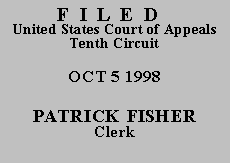

| ACCOUNTABILITY (a.k.a. "BOSS
EINSTEIN") BURNS,
v.
VETERANS ADMINISTRATION,
sued as: VA/VARO-Muskogee, |
No. 98-5069
(D.C. No. 98-CV-249-K (M)) |
Under 42 U.S.C. § 2000e-5(f)(1), a court may, "[u]pon application by the complainant and in such circumstances as the court may deem just, . . . authorize the commencement of [an] action [under this section] without the payment of fees, costs, or security." The language of this provision is substantially similar to that of the broader general statute governing proceedings in forma pauperis, 28 U.S.C. § 1915(a), under which a court may authorize the commencement of "any" suit "without prepayment of fees or security" by a person who submits an affidavit stating his or her inability to pay.
The decision to grant or deny in forma pauperis status under § 1915 lies within the sound discretion of the trial court. Cross v. General Motors Corp., 721 F.2d 1152, 1157 (8th Cir. 1983), cert. denied, 466 U.S. 980 (1984). The language of § 2000e-5(f)(1) ("in such circumstances as the court may deem just") reflects a similarly discretionary standard for granting a Title VII plaintiff leave to file suit without payment of fees. Upon review of the documents originally submitted by Mr. Burns in support of his application, we find no abuse of discretion by the district court.
Somewhat troubling is the question of whether this case is properly brought under Title VII. The section under which Mr. Burns submitted his application for leave to file without payment of fees, 42 U.S.C. § 2000e, addresses equal employment opportunities and discriminatory employment practices. As such, it does not appear to be the proper vehicle for redress of Mr. Burns' claims for compensation from the Veterans Administration for violation of civil rights stemming from the denial of veterans' benefits.
Even liberally construing Mr. Burns' pro se filings as stating a Bivens type of action, however, see Bivens v. Six Unknown Fed. Narcotics Agents, 403 U.S. 388 (1971), his ability to proceed in forma pauperis still would be governed by the discretionary standard under 28 U.S.C. § 1915. Thus, the outcome of his attempt to proceed without payment of fees would not differ, as no abuse of discretion is evident.
In addition to appealing the denial of his application to file without payment of costs, Mr. Burns also brings a "Motion for Immediate Mandamus" seeking payment to him of a "prosecution fund" in the amount of $10,000,000, apparently for purposes of launching an investigation into certain rights violations.
Mandamus is an extraordinary remedy, United States v. Roberts, 88 F.3d 872, 882 (10th Cir. 1996), and "will issue only in those exceptional cases where the inferior court has acted wholly without jurisdiction or so clearly abused its discretion as to constitute a judicial usurpation of power." In re Kaiser Steel Corp., 911 F.2d 380, 387 (10th Cir. 1990). A petitioner for a writ of mandamus bears the burden of showing that his or her right to the writ is clear and indisputable. In re Weston, 18 F.3d 860, 864 (10th Cir. 1994) (citing Mallard v. United States Dist. Court, 490 U.S. 296, 309 (1989)). Mr. Burns has failed to make any such showing.
For the above reasons, we AFFIRM the district court's denial of Mr. Burns' Application for Leave to File Without Payment of Fees, DENY the petition for mandamus, and DISMISS the appeal.
The mandate shall issue forthwith.
ENTERED FOR THE COURT
David M. Ebel
Circuit Judge
*.After examining appellant's brief and the appellate record, this panel has determined unanimously that oral argument would not materially assist the determination of this appeal. See Fed. R. App. P. 34(f) and 10th Cir. R. 34.1.9. The case is therefore ordered submitted without oral argument. This Order and Judgment is not binding precedent, except under the doctrines of law of the case, res judicata, and collateral estoppel. The court generally disfavors the citation of orders and judgments; nevertheless, an order and judgment may be cited under the terms and conditions of 10th Cir. R. 36.3.